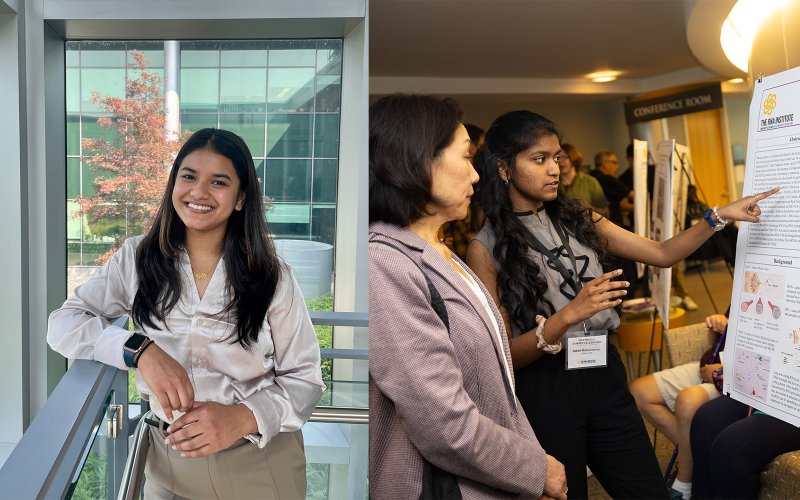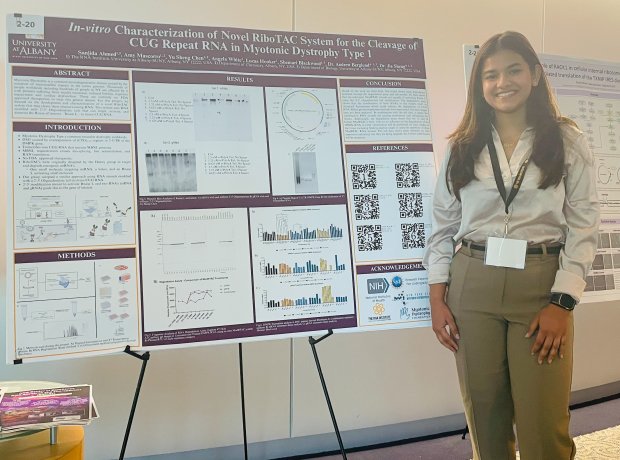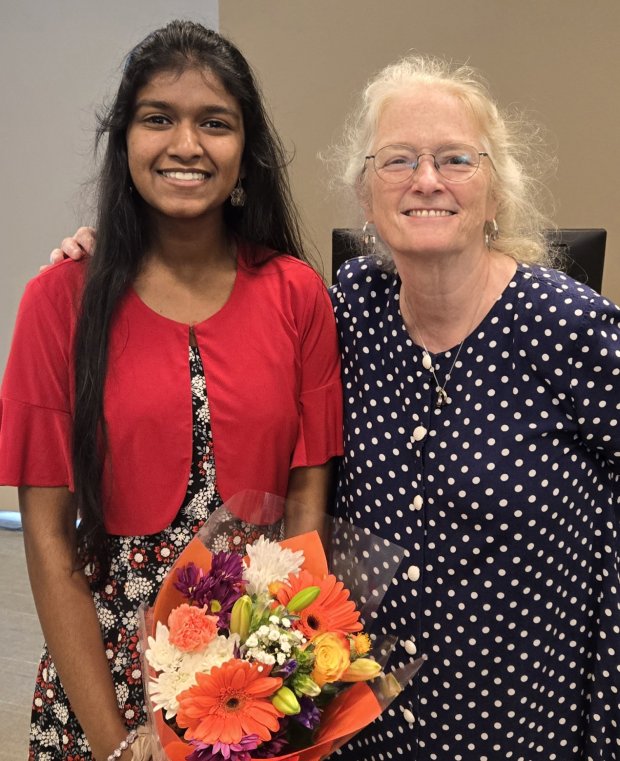Summer Spotlight: UAlbany Undergrads Study Myotonic Dystrophy, Breast Cancer

By Erin Frick
ALBANY, N.Y. (Sept. 10, 2024) — UAlbany undergrads are helping tackle important research questions connected to life-shaping diseases.
Alongside researchers in the RNA Institute and the Cancer Research Center, Sanjida Ahmed and Sakthi Muthukrishnan spent their summers inside the lab, wielding pipettes and advanced analytical equipment to further our understanding of important disease processes with the goal to inform new therapeutics and improve lives.
Here's a snapshot of what these student scholars investigated this summer.
Sanjida Ahmed
Sanjida Ahmed is a junior on the pre-health track who dreams of becoming a physician-scientist involved in clinical research. Majoring in Biochemistry and Molecular Biology, she is also a Peer of Experience and Training (POET) in the Honors College.
Ahmed first got involved in RNA Institute research during her sophomore year when she undertook a position as a research assistant in associate professor Jia Sheng’s lab working on myotonic dystrophy—the most common form of adult onset muscular dystrophy.
This work led her to apply for the 2024 Research Experiences for Undergraduates program at the RNA Institute. This National Science Foundation-funded program pairs undergraduates with faculty researchers to participate in hands-on research over the course of a summer. This was the second year the program has run at the RNA Institute. Ahmed was among ten students from colleges and universities across the country who participated in the program.
"This summer, I studied myotonic dystrophy at a genetic level under the Sheng Lab with an amazing mentor, Amy Merritt. We worked on a project involving a system called RiboTAC (ribonuclease targeting chimera), which was originally designed by another lab to cleave, or stop, cancer-causing RNA," said Ahmed. "Our research team modified the process to cleave the RNA in cells involved in myotonic dystrophy.
"Proteins are an important part of the myotonic dystrophy disease system. In people with myotonic dystrophy, repeats of the genetic codes are responsible for creating a hairpin loop that recruits a particular protein. You can picture this as a tangled ribbon that traps the proteins and stops them from operating as they should. We are trying to develop a molecular tool that would operate like a pair of scissors that cuts the ribbon so the proteins can be released and return to their normal function."
Ahmed will continue the research through the fall, with new collaborations planned with RNA Institute Director and Keith Hynes Endowed Professor in STEM Andy Berglund and Assistant Professor of Chemistry Ting Wang.
"This new line of work will focus on exploring a different therapeutic that involves small molecules. With the Ting Lab, I will focus on organic synthesis to make potential drugs using small molecules to treat myotonic dystrophy. With the Berglund Lab, I will learn how to test these small molecules on cells derived from myotonic dystrophy-1 patients."
Sakthi Muthukrishnan
Sakthi Muthukrishnan is a senior majoring in biochemistry and molecular biology. Sakthi’s UAlbany research career started in 2021 when she participated in the RNA Institute Summer Bioinformatics program as a high school student, working with Williams-Raycheff Endowed Professor Melinda Larsen. As a UAlbany student, she participated in the program again in 2022 and 2024, most recently working with Associate Professor Jason Herschkowitz who is jointly affiliated with the RNA Institute and the Cancer Research Center. Her work this summer focused on triple negative breast cancer. Her work was recognized with the designation of “Outstanding Poster Presentation” at the Institute’s summer-end symposium.
"Breast cancer is a disease that develops in breast tissue due to abnormal cells," said Sakthi. "There are several types of breast cancer, and they can be identified by specific molecular characteristics. Triple negative breast cancer is an aggressive subtype that is the focus of our research. While there are various different types of breast cancer, the treatment approaches across types are similar. This means that even milder forms are often treated with aggressive methods. Our work aims to inform a treatment that is specifically modulated to address triple-negative breast cancer."
As part of the Herschkowitz lab, Sakthi is looking at a specific type of RNA called super enhancer long noncoding RNA, or "SE-lncRNA."
"In the lab, we conduct experiments that focus on the expression of a neighboring gene implicated in triple-negative breast cancer," said Sakthi. "We are also trying to repeat ‘knockdown’ of specific RNAs involved in breast cancer cell proliferation. Understanding these processes can help reveal new targets for therapeutic approaches."
Sakthi will continue this research with Herschkowitz this fall.
"I hope to pursue a career in scientific research, specifically in cancer research in the biotech and pharma industry focusing on cancer prevention, detection and developing therapeutics. In addition to knowledge and lab skills, the work I’ve done so far has taught me so much about the research process. When you're doing an experiment, you can't have one hundred percent success for every trial or project you take up. Testing and repeating is an important cycle to get used to and learn to love. Through careful, strategic trial and error is how we find successful results."






